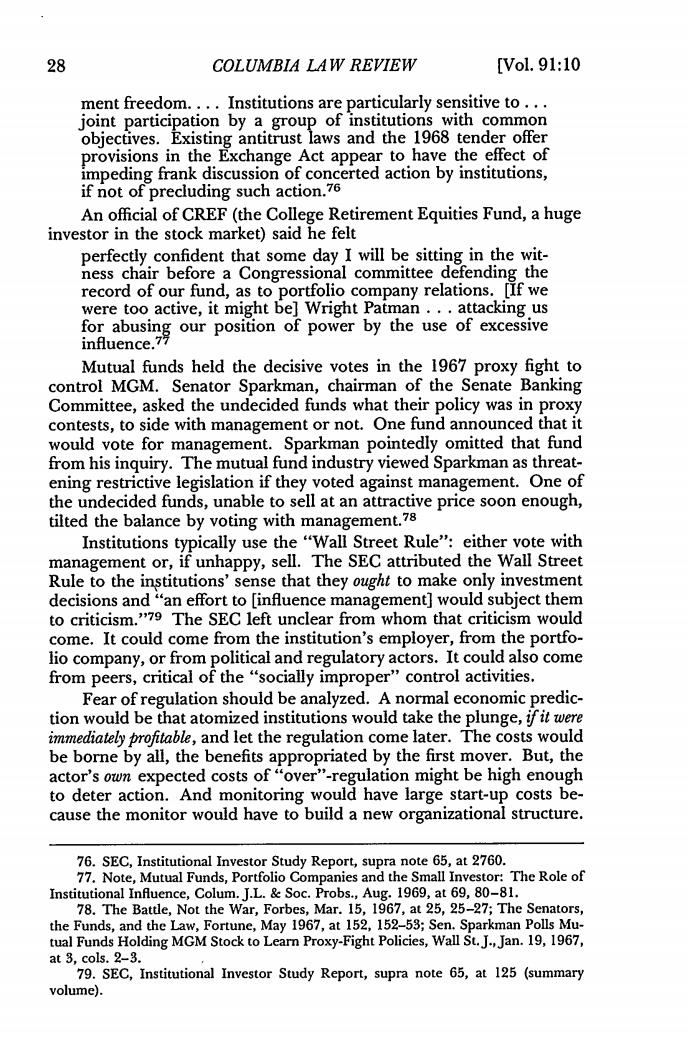正在加载图片...

28 COLUMBIA LAW REVIEW [Vol.91:10 Institutions are particularly sensitive to. ation by a up of institutions with common esting as aws and the 1968 tender offen ons in the Exchange Act ap mpeding frank discussion of concerted action by institutions, eding frank discussion An official of CREF(the College Retirement Equities Fund,a huge investor in the stock market)said he felt perfectly will be sitting in the wit- ngress o itt the as to npan relation att ere toc f power by the e use of exce Mutual funds held the decisive votes in the 1967 proxy fight to control MGM.Senator Sparkman,chairman of the Senate Banking Committee,asked the undecided funds what their policy was in proxy contests,to side with management or not. One fu ind annou ced that would vote for management.Sparkman pointedly omitted that fund from his inquiry.The mutual fund industry viewed Sparkman as threat- ening restrictive legislation if they voted against management.One of the undecided funds,unable to sell at an attractive price soon enough, tilted the balance by voting with management.78 Institutions typically use the "Wall Street Rule":either vote with management or,if unhappy,sell.The SEC attributed the Wall Street Rule to the ins titutions's nse that they ought to make only investment decisior an effo ce en]would subject them to criticism. The SEC le t unc ar from whom tha m wo d come.It could come from the institution's employer,from the portfo lio company,or from political and regulatory actors.It could also come from pee ers.critical of the "socially improper control activities Fear of regulation should be e an rmal economic predic tion would be that atomized institutions would take the plunge,ifit wer immediately profitable,and let the regulation come later.The costs would be borne by all,the benefits appropriated by the first mover.But,the ected costs of"over"-regulation might be high enough action And would have large start-up costs be cause the monitor would have to build a new organizational: Mutual Fu Comp n0e65,at2760 The Role of 78.The Bautle.Not the War.Fo Mar 25.25-27:The Senators the Funds,and the Law,Fortune,May 1967,at 152,152-53;Sen.Sparkman Polls Mu- tual Funds Holding MGM Stock to Learn Proxy-Fight Policies,Wall St.J.,Jan.19,1967. at 3,cols.COLUMBIA LAW REVIEW ment freedom. Institutions are particularly sensitive to. joint participation by a group of institutions with common objectives. Existing antitrust laws and the 1968 tender offer provisions in the Exchange Act appear to have the effect of impeding frank discussion of concerted action by institutions, if not of precluding such action.76 An official of CREF (the College Retirement Equities Fund, a huge investor in the stock market) said he felt perfectly confident that some day I will be sitting in the witness chair before a Congressional committee defending the record of our fund, as to portfolio company relations. [If we were too active, it might be] Wright Patman . attacking us for abusing our position of power by the use of excessive influence. 77 Mutual funds held the decisive votes in the 1967 proxy fight to control MGM. Senator Sparkman, chairman of the Senate Banking Committee, asked the undecided funds what their policy was in proxy contests, to side with management or not. One fund announced that it would vote for management. Sparkman pointedly omitted that fund from his inquiry. The mutual fund industry viewed Sparkman as threatening restrictive legislation if they voted against management. One of the undecided funds, unable to sell at an attractive price soon enough, tilted the balance by voting with management. 78 Institutions typically use the "Wall Street Rule": either vote with management or, if unhappy, sell. The SEC attributed the Wall Street Rule to the institutions' sense that they ought to make only investment decisions and "an effort to [influence management] would subject them to criticism."' 79 The SEC left unclear from whom that criticism would come. It could come from the institution's employer, from the portfolio company, or from political and regulatory actors. It could also come from peers, critical of the "socially improper" control activities. Fear of regulation should be analyzed. A normal economic prediction would be that atomized institutions would take the plunge, if it were immediately profitable, and let the regulation come later. The costs would be borne by all, the benefits appropriated by the first mover. But, the actor's own expected costs of "over"-regulation might be high enough to deter action. And monitoring would have large start-up costs because the monitor would have to build a new organizational structure. 76. SEC, Institutional Investor Study Report, supra note 65, at 2760. 77. Note, Mutual Funds, Portfolio Companies and the Small Investor: The Role of Institutional Influence, Colum.J.L. & Soc. Probs., Aug. 1969, at 69, 80-81. 78. The Battle, Not the War, Forbes, Mar. 15, 1967, at 25, 25-27; The Senators, the Funds, and the Law, Fortune, May 1967, at 152, 152-53; Sen. Sparkman Polls Mutual Funds Holding MGM Stock to Learn Proxy-Fight Policies, Wall St.J.,Jan. 19, 1967, at 3, cols. 2-3. 79. SEC, Institutional Investor Study Report, supra note 65, at 125 (summary volume). [Vol. 91:10